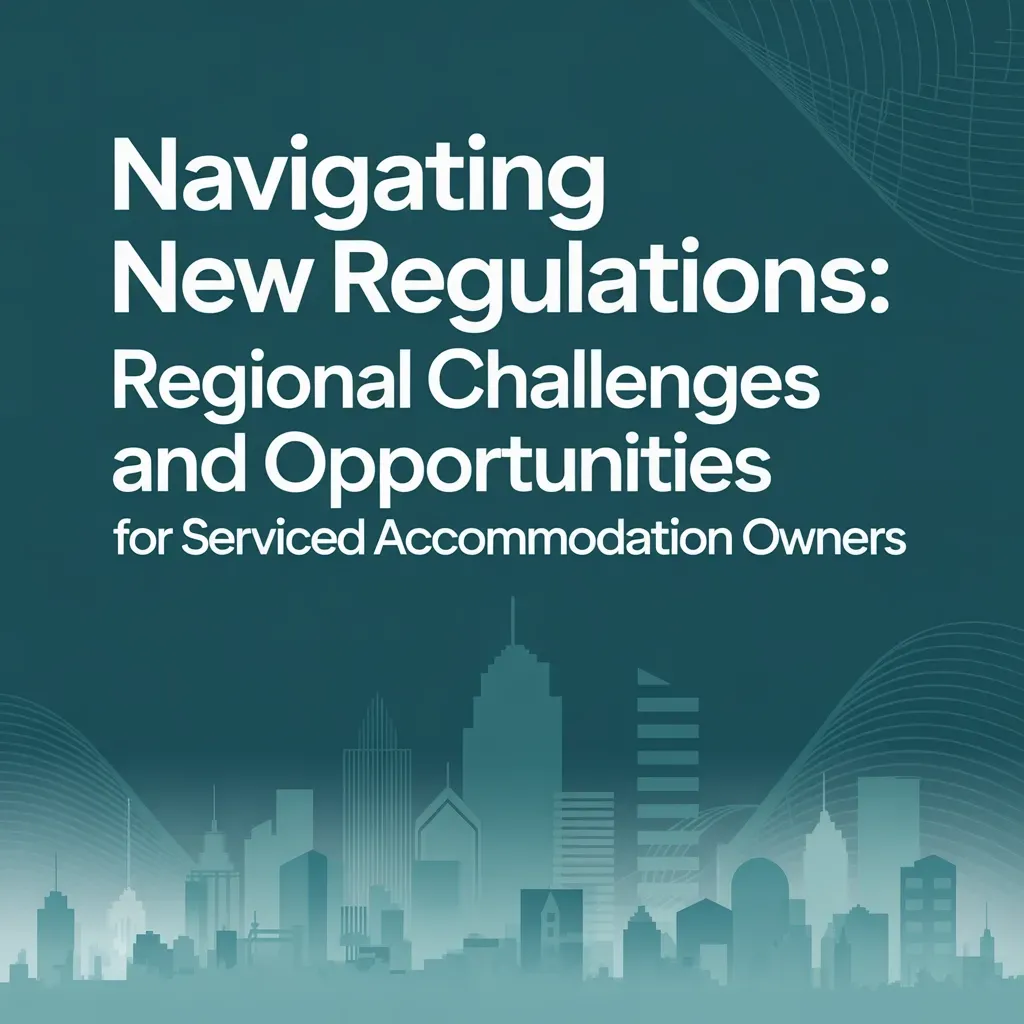
Navigating New Regulations: Regional Challenges and Opportunities for Serviced Accommodation Owners
The landscape for short-term rentals has transformed dramatically, leaving many landlords scratching their heads about whether to make the leap from traditional letting to Airbnb. With new regulations rolling out across the UK and internationally, what used to be a straightforward decision now requires careful navigation through a maze of compliance requirements, tax implications, and local authority rules.
But here's the thing – these regulatory changes aren't just creating obstacles. They're also opening up massive opportunities for landlords who understand how to work within the new framework. The key is knowing what you're dealing with and having the right support to handle the complexities.
The UK's Regulatory Revolution
The biggest game-changer came in 2024 when the UK government introduced the new C5 use class specifically for short-term lets. This means that from now on, if you want to convert a property from traditional rental to short-term letting, you'll need planning permission in most cases.

However, there's a crucial exception that many landlords don't know about: if you're renting out your primary residence, you can still do up to 90 nights per year without needing planning permission. This creates a sweet spot for homeowners looking to generate extra income without the full regulatory burden.
For landlords with investment properties, the C5 classification actually brings some much-needed clarity. Yes, you'll need to jump through more hoops, but you'll also know exactly where you stand legally. No more operating in the grey areas that used to characterize the short-term rental space.
The compliance requirements go well beyond planning permission though. Each local authority has its own licensing requirements, safety standards, and operational rules. What's acceptable in Manchester might not fly in Edinburgh, and London boroughs each have their own specific requirements.
Tax Changes That Change Everything
2025 brought significant tax changes that completely altered the financial landscape for short-term rental properties. The big shift? Properties owned in personal names are now subject to Section 24 restrictions, treating them as residential properties rather than trading businesses.
This means different capital gains tax rates (18% for basic rate taxpayers, 24% for higher rate) and restrictions on mortgage interest deductions. For many landlords, this has made the transition from traditional rental to short-term letting more complex from a financial planning perspective.
But here's where it gets interesting – these changes have also created opportunities for landlords who structure their businesses correctly and understand the new tax landscape. The key is getting professional guidance to navigate these waters effectively.
Regional Challenges Across the UK
What makes the regulatory landscape particularly tricky is how much it varies by location. London boroughs have some of the strictest requirements, with the 90-night rule heavily enforced and additional licensing requirements that can take months to obtain.
Scotland has taken a different approach, implementing a licensing scheme that requires all short-term rental properties to be licensed by their local authority. The process includes checks on the property, the host, and compliance with safety standards.

Wales is considering similar measures, while Northern Ireland maintains a relatively light-touch approach for now. This patchwork of regulations means landlords with properties in multiple areas face the challenge of compliance across different regulatory frameworks.
The challenge for landlords isn't just understanding these requirements – it's staying compliant while actually running a profitable short-term rental business. That's where having experienced management becomes crucial.
International Perspectives and Lessons
The UK isn't alone in grappling with short-term rental regulations. Cities worldwide are implementing new rules, and there are lessons to be learned from how other markets have adapted.
New York City has some of the strictest regulations globally, with recent changes making it nearly impossible to operate short-term rentals in many parts of the city. However, operators who can meet the requirements face less competition and higher returns.
European cities like Amsterdam and Barcelona have implemented caps on the number of short-term rental licenses available, creating scarcity value for existing operators. The lesson? Getting compliant early often means getting ahead of the competition.
Hidden Opportunities in Regulatory Complexity
While the regulatory changes create challenges, they're also creating significant opportunities for landlords who can navigate them effectively:
Reduced Competition: Many amateur operators are being squeezed out by compliance costs and complexity, leaving more market share for professional operations.
Premium Positioning: Fully compliant properties can command higher rates by offering guests the peace of mind that comes with proper licensing and safety standards.
Long-term Security: Properties that achieve full compliance have sustainable business models that aren't at risk from future regulatory crackdowns.

Professional Advantage: Landlords who work with experienced short-term rental management companies can leverage expertise and systems that individual operators can't match.
The Compliance Maze: Why Professional Management Matters
Here's the reality – navigating these regulations while actually running a successful short-term rental business is a full-time job. You need to understand local planning requirements, obtain necessary licenses, maintain safety standards, handle guest communications, manage pricing and availability, coordinate cleaning and maintenance, and stay on top of changing regulations.
For most landlords, especially those with traditional rental experience, this represents a completely new skill set. The learning curve is steep, and the cost of mistakes can be significant.
This is where professional Airbnb management becomes invaluable. A specialized management company brings:
Regulatory Expertise: Deep understanding of local requirements and compliance procedures
Systems and Processes: Established workflows for maintaining compliance while maximizing revenue
Risk Management: Insurance, safety protocols, and legal protection
Market Knowledge: Pricing strategies, guest preferences, and competitive positioning
Operational Excellence: Guest communication, property maintenance, and revenue optimization
Making the Transition: A Strategic Approach
For landlords considering the switch from traditional rental to short-term letting, the key is taking a strategic approach that considers both the regulatory landscape and your specific situation.
Start with a thorough assessment of your property's eligibility under current regulations. Not every property will be suitable for short-term rental, and it's better to know this upfront than discover it after investing time and money in the transition.
Consider your local market dynamics. High tourist areas with strong demand can justify the additional complexity and costs of compliance, while areas with limited visitor appeal might not generate the returns needed to make short-term rental worthwhile.

Evaluate your own capacity for managing the regulatory requirements. If you're looking for a hands-off investment, partnering with a professional management company isn't just helpful – it's essential.
The Future of Short-Term Rental Regulations
Looking ahead, the trend is clearly toward more regulation, not less. Local authorities are under pressure from residents concerned about housing availability and tourism impacts, while national governments are looking to balance economic benefits with social concerns.
However, this doesn't mean the end of opportunities in short-term rental. Instead, it means the market is professionalizing, with serious operators who can meet regulatory requirements replacing casual hosts who can't or won't adapt.
For landlords, this evolution represents both a challenge and an opportunity. Those who can navigate the regulatory landscape effectively – whether through their own expertise or by partnering with professional management companies – are positioned to benefit from reduced competition and improved market dynamics.
Making Your Decision
The regulatory landscape for short-term rentals is complex and constantly evolving, but it's not insurmountable. The key is understanding what you're getting into and having the right support to navigate the challenges effectively.
If you're a landlord considering the transition from traditional rental to short-term letting, don't let regulatory complexity scare you away from potentially lucrative opportunities. Instead, focus on getting the right advice and support to make informed decisions about your property portfolio.
The landlords who succeed in this new environment won't necessarily be those who understand every regulatory detail themselves – they'll be those who recognize when to bring in professional expertise to handle the complexity while they focus on the bigger picture of building wealth through property investment.
